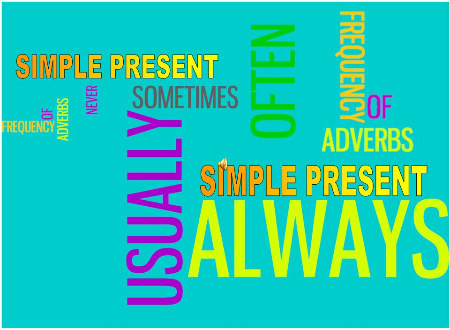We use some adverbs to describe how frequently we do an activity.
These are called adverbs of frequency and include:
| Frequency | Adverb of Frequency | Example Sentence |
|---|---|---|
| 100% | always | I always go to bed before 11pm. |
| 90% | usually | I usually walk to work. |
| 80% | normally / generally | I normally go to the gym. |
| 70% | often* / frequently | I often surf the internet. |
| 50% | sometimes | I sometimes forget my wife's birthday. |
| 30% | occasionally | I occasionally eat junk food. |
| 10% | seldom / rarely | I seldom read the newspaper. |
| 5% | hardly ever | I hardly ever drink alcohol. |
| 0% | never | I never swim in the sea. |
* Some people pronounce the 'T' in often but many others do not.
The Position of the Adverb in a Sentence
An adverb of frequency goes before a main verb (except with To Be).
| Subject + adverb + main verb |
|---|
| I always remember to do my homework. |
| He normally gets good marks in exams. |
An adverb of frequency goes after the verb To Be.
| Subject + to be + adverb |
|---|
| They are never pleased to see me. |
| She isn't usually bad tempered. |
Try these links for some useful exercises
http://www.englisch-hilfen.de/en/exercises/adjectives_adverbs/adverbs_of_frequency.htm
http://www.englisch-hilfen.de/en/exercises/adjectives_adverbs/adverbs_of_frequency1.htm (HOMEWORK)
http://www.ego4u.com/en/cram-up/grammar/word-order/exercises?11
http://esl.lbcc.cc.ca.us/eesllessons/adverbfreq/adfreqz.htm
http://perso.wanadoo.es/autoenglish/gr.frequ.i.htm
http://www.autoenglish.org/gr.frequ.i.htm

